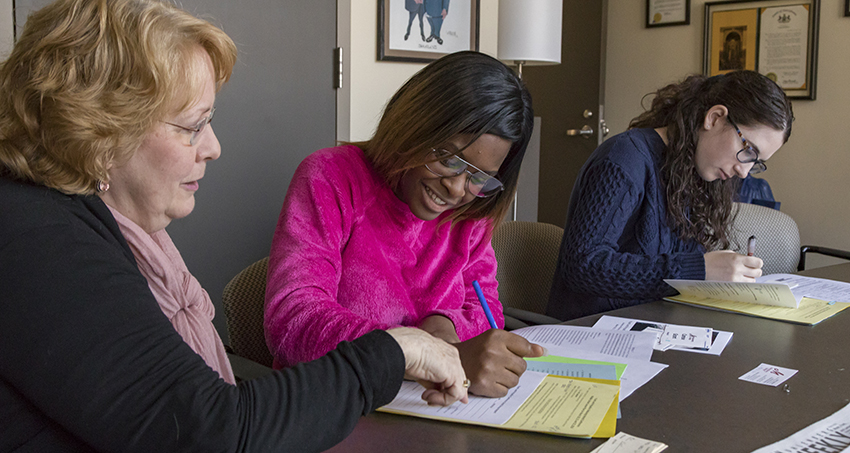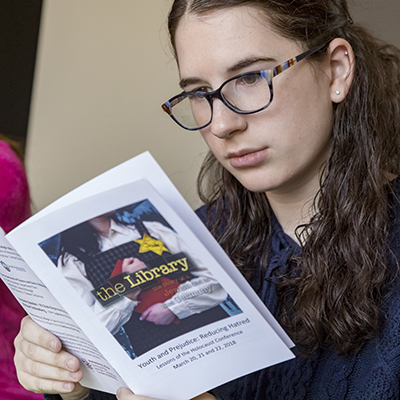Wanted: Help to Stop Hate, Sow Hope
At Muhlenberg College's Youth and Prejudice Conference, student volunteers can effect real change in young lives.By: Shelley Drozd Friday, March 16, 2018 11:45 AM
 Marcie Lightwood, IJCU schools program coordinator, meets with student volunteers Carese Grant ’21 and Emma Schwartz ’21 to prepare for the 2018 Youth and Prejudice Conference.
Marcie Lightwood, IJCU schools program coordinator, meets with student volunteers Carese Grant ’21 and Emma Schwartz ’21 to prepare for the 2018 Youth and Prejudice Conference. Hate has no home here. More than a message, it’s become the sign of our times, a visible symbol of conscience, an avowed commitment to building just, inclusive communities.
The HHNHH project isn’t quite two years old, but its message has long been the clarion call of the Institute of Jewish-Christian Understanding (IJCU). Since 1989, through interfaith dialogue and community outreach programs, the IJCU has taken on some of society’s thorniest topics, exemplifying Muhlenberg’s long tradition of promoting peace, activism and social justice.
One of the IJCU’s most popular and enduring programs returns to the Muhlenberg campus next week.The middle-school edition of the Youth and Prejudice: Reducing Hatred Conference will take place Tuesday-Thursday, March 20-22, from 9:15 a.m.-1:30 p.m. Later in the school year, the IJCU will reprise the same program, reimagined for a high school audience.
The age of the audience varies, but the mission of the conference is resolute: Reduce hatred by learning the lessons of the Holocaust.
The age-appropriate intention is at once timely and urgent. From swastikas painted on walls to nooses hanging in bathrooms, there is a growing tendency for hate crimes to happen in our middle and high schools, says Marcie Lightwood, IJCU schools program coordinator.
National studies reflect this troubling trend. One case in point: A 2018 audit by the Anti-Defamation League (ADL) found that anti-Semitic incidents in K-12 schools and college campuses in 2017 nearly doubled for the second year in a row.
Such statistics help explain the widespread demand for the Youth and Prejudice Conference. Over the past 10 years, the program has hosted an average of 700 middle school students and 400 high school students, coming from school districts as far-flung as Reading and Easton. And attendance proves that the demand is perennial: Since it began in 1994, the conference has educated more than 25,000 middle and high school students throughout the greater Lehigh Valley.
Even with three days of programming scheduled for this year, the IJCU still had to turn away schools.
“When that happens, we will take a program to a school,” says Lightwood. “Working closely with our partners at the Jewish Federation [of the Lehigh Valley], we’ll arrange for speakers, resources, and teacher training materials. We do that every year for whatever school needs it.”
The benefits of volunteering
 For all its longevity, reach and good work, Lightwood estimates that only 1 in 10 people at Muhlenberg actually know about the Youth and Prejudice Conference. “Because it doesn’t involve a great number of students and happens behind the scenes, it’s almost invisible,” she says.
For all its longevity, reach and good work, Lightwood estimates that only 1 in 10 people at Muhlenberg actually know about the Youth and Prejudice Conference. “Because it doesn’t involve a great number of students and happens behind the scenes, it’s almost invisible,” she says.
Year after year, the conference has no trouble attracting willing volunteers from the community. Each event involves up to 25 facilitators and 20 Holocaust survivor family members. Some facilitators have come out of retirement this year because they believe so strongly in the conference mission, given the political climate. One actually took off three days from his job.
Muhlenberg student volunteers have been harder to come by. Typically, Lightwood gets a flurry of interest from students in the last few days leading up to the conference.
So why be a student volunteer?
To see a powerful performance. The conference kicks off with “The Library,” a play that traces the life of a young Jewish girl growing up in Germany during Hitler’s rise to power.
To learn the dynamics of prejudice. Co-facilitators have the opportunity to work with community anti-prejudice activists and to hear the witness of a Holocaust Survivor family member.
To change hearts and minds. In no small measure do volunteers help empower middle school students to recognize prejudice and take action against it in their own settings. “In order to make a better society next year, we need to start this year in training the young people that are coming up,” says Lightwood.
Prospective volunteers can email [email protected] or call 484-664-3292.
